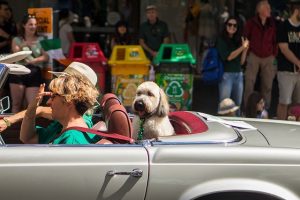It’s an interesting irony—and quite typical of Vietnam—that despite a lack of sensitivity to animal feelings or rights, and occasional animal cruelty, a growing number of Hanoians are discovering the pleasure of owning pets. Some own purebred animals as a sign of wealth and status, but the majority of pet owners keep animals for the simple solace of companionship.
Sidewalk space is hard to come by in downtown Hanoi, even for pedestrians. Outlying areas such as West Lake are much more amenable to dog-walking, but there are still few places where dogs can be let off the leash. Some western expats offer dog-walking services—community bulletin boards are the best place to look for these freelancers.

Rabies exists in Vietnam, so pets must be inoculated annually. You should also consider getting rabies vaccination as well.
Vietnamese eat dog meat, but it is unlikely your dog will be abducted for culinary purposes – the Vietnamese only eat one type of dog which is raised for the purpose. However, if you own a purebred animal, its monetary value may make it a target of theft, so be careful.
Pet food and kitty litter are available at most supermarkets, though most locals feed their pets leftover meat and rice. Prices for imported pet foods are significantly higher than in the countries where they are produced.
There is no quarantine for imported pets, though you must follow the regulations listed in the “Importing Your Pet” section before arrival.
Several veterinarians provide all health services for pets, including euthanasia if necessary, and some are available for house calls.
Hamsters were banned in Vietnam in 2008.

